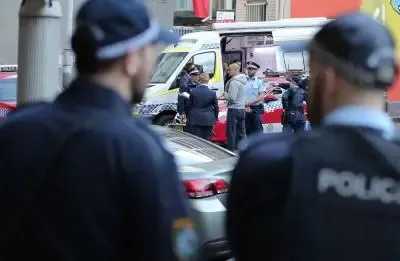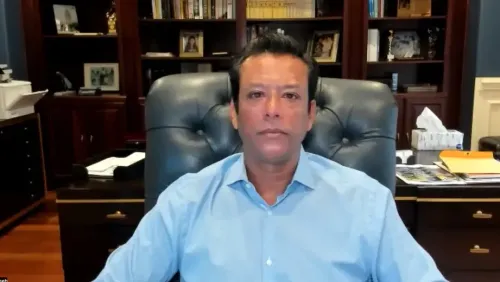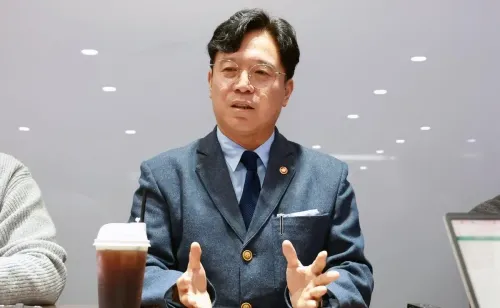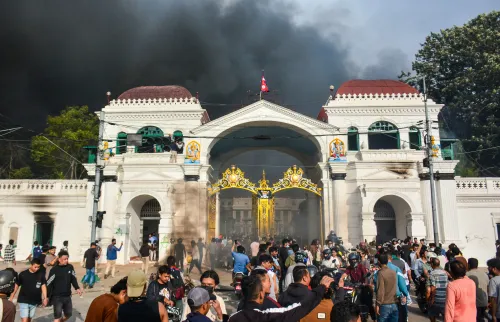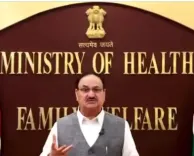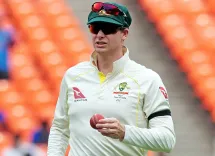Is Trump Facilitating a Meeting Between Zelensky and Putin?
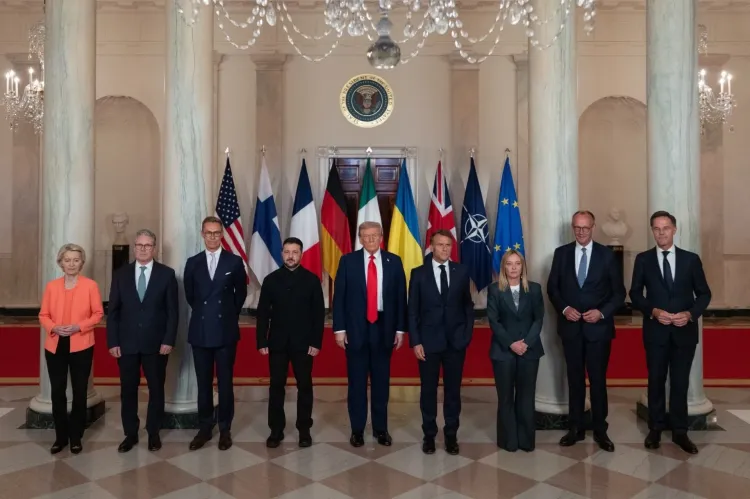
Synopsis
Key Takeaways
- Trump is arranging a meeting between Zelensky and Putin to discuss peace.
- European leaders support Ukraine's security guarantees.
- Concerns over territorial disputes persist.
- A ceasefire is debated among leaders.
- Ongoing violence underscores the urgency for peace negotiations.
New York, Aug 19 (NationPress) Following discussions with Ukraine's President Volodymyr Zelensky and European leaders, US President Donald Trump has revealed his plans to facilitate a meeting between Zelensky and Russian President Vladimir Putin as part of his initiative to conclude the catastrophic war that has resulted in the loss of hundreds of thousands of lives, both civilian and military.
"Everyone is extremely optimistic about the prospect of PEACE for Russia and Ukraine," he stated on Truth Social on Monday after the meetings.
Germany's Chancellor Friedrich Merz, who attended the meeting, supported Trump’s sentiment, tweeting, "Today’s meeting with President Trump, President Zelensky, and our European allies was productive."
However, he cautioned, "The upcoming steps will be more complex."
Regarding direct peace negotiations, Trump mentioned, "I reached out to President Putin and initiated arrangements for a meeting, with the location to be finalized, between President Putin and President Zelensky."
"Following that meeting, we will hold a trilateral meeting involving the two Presidents and myself," he added.
"This is a very promising initial step towards resolving a conflict that has persisted for nearly four years," he remarked.
US Vice President J.D. Vance, Secretary of State Marco Rubio, and Special Envoy Steve Witkoff are currently collaborating with both Russia and Ukraine for these meetings, Trump disclosed.
The meetings ensued after Trump's encounter with Putin on Friday, during which he unexpectedly dropped his demand for an immediate ceasefire, surprising Zelensky and European leaders.
A significant breakthrough in the peace discussions involves Trump and the leaders’ consensus on providing security guarantees for Ukraine.
Trump stated that Putin has agreed to the proposed security measures.
This security guarantee is crucial for Ukraine amid concerns that Putin might retract from a peace agreement and potentially invade again.
Trump expressed readiness for US involvement in the security guarantee, which may include deploying US troops alongside European peacekeepers.
"During our meeting, we discussed security guarantees for Ukraine, which would be provided by various European nations in coordination with the United States," Trump stated on Truth Social.
Earlier, Britain’s Prime Minister Keir Starmer remarked that security guarantees would represent a "historic milestone."
Given that Putin has opposed Ukraine's NATO membership—one of the reasons he cited for initiating the war in 2022—the security guarantees would offer protection to Ukraine, as any aggressor would have to contend with NATO forces deployed as peacekeepers.
Earlier on the same day, Trump had a cordial meeting with Zelensky, contrasting sharply with their tense Oval Office interaction in February when he openly criticized him.
"We are committed to collaborating with Ukraine, and we will ensure that if peace is achieved, it remains sustainable in the long run," he stated before their bilateral meeting.
Zelensky described their discussion as "very constructive," emphasizing, "We spoke about highly sensitive topics."
"Today has been very successful so far," he noted.
Due to the February incident, European leaders were concerned that Trump might pressure Zelensky into accepting an unfavorable agreement and traveled to Washington to support him.
Present at the meeting were Presidents Emmanuel Macron of France, Alexander Stubb of Finland, Prime Ministers Keir Starmer of Britain and Giorgia Meloni of Italy, Chancellor Merz of Germany, EU President Ursula von der Leyen, and NATO Secretary General Mark Rutte.
Trump noted that the gathering of such influential leaders at the White House was unprecedented.
The European leaders lauded Trump significantly. For instance, Meloni remarked, "This is an important day—a new beginning—after three years of seeing no indication from the Russian side that they were open to dialogue, something is shifting—thanks to you."
Two key issues remained unresolved.
While European leaders advocated for a ceasefire, Trump insisted on moving directly towards a comprehensive peace agreement.
During the open segment of the European summit, Merz tactfully raised the ceasefire issue, which Trump had previously insisted upon before the Putin summit.
"I cannot envision the next meeting occurring without a ceasefire," the German Chancellor stated.
French President Macron affirmed that European leaders are united in their desire for a ceasefire.
Trump countered that he had successfully reached peace deals in other conflicts without a prior ceasefire.
"If we can secure a ceasefire, fantastic," he said. "President Zelensky and President Putin can discuss that further."
The urgency of a ceasefire was emphasized by ongoing Russian assaults shortly before the White House discussions began.
At least 10 individuals, including a one-year-old child, lost their lives in attacks on Kharkiv and Zaporizhzhia on Monday.
Another unresolved matter pertains to the future of territories seized by Russia, which Ukraine seeks to reclaim, while European leaders assert that Moscow should not retain the spoils of invasion.
On Sunday, Trump declared on Truth Social, "No returning to Obama over Crimea (12 years ago, without a shot fired!)."
Trump referred to Russia’s annexation of Ukraine's Crimean Peninsula in 2014 without military resistance during Barack Obama’s presidency, implying that in any settlement, Kyiv might have to relinquish claims to it.
Putin aims not only to retain parts of the Donetsk region, which has a significant ethnic Russian population but also seeks to claim its entirety.
Rubio mentioned on a TV program on Sunday that territorial concessions would be unavoidable.
"If one side receives everything they desire, that is termed surrender. And we are not approaching that situation, as neither side is contemplating surrender or anything akin to it," he concluded.

